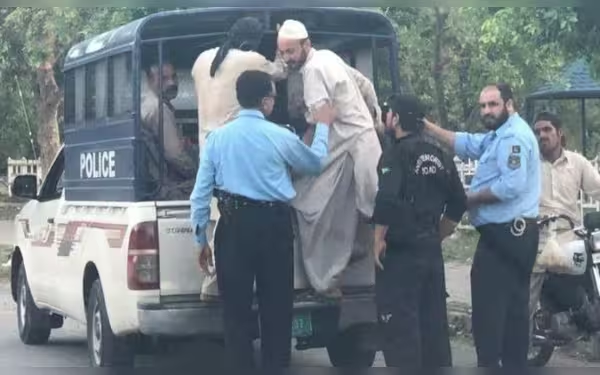Saturday, November 16, 2024 08:37 PM
Karachi's Crackdown on Professional Begging: 79 Arrested
- 79 professional beggars arrested in Karachi over two days.
- Commissioner emphasizes rehabilitation over punishment.
- Authorities aim to address root causes of begging.
 Image Credits: urdupoint
Image Credits: urdupointKarachi authorities arrest 79 professional beggars, focusing on rehabilitation and addressing root causes of begging.
In recent times, the issue of professional begging has become increasingly prominent in urban areas of Pakistan, particularly in Karachi. This phenomenon not only affects the daily lives of citizens but also raises questions about social welfare and the responsibilities of local authorities. Professional beggars often congregate at busy traffic signals, intersections, and highways, creating challenges for commuters and pedestrians alike. The situation has prompted the government to take decisive action.
In a significant move, a recent crackdown on professional begging led to the arrest of 79 individuals over the course of just two days. These arrests were part of a broader initiative aimed at addressing the growing concerns surrounding this issue. The deputy commissioners submitted reports to the Commissioner of Karachi, detailing the arrests and the ongoing efforts to manage the situation effectively.
Commissioner Karachi, Syed Hassan Naqvi, has emphasized the importance of rehabilitation in tackling the problem of begging. He stated that the authorities are working diligently to establish a rehabilitation center where those involved in begging can receive the support they need. This initiative aims not only to reduce the number of professional beggars on the streets but also to provide them with a chance to reintegrate into society.
As part of this effort, Deputy Commissioners have been instructed to identify suitable locations where these individuals can be accommodated and cared for during their rehabilitation process. The goal is to create a safe and supportive environment that encourages personal growth and self-sufficiency.
It is essential to recognize that the issue of professional begging is complex and multifaceted. Many individuals resort to begging due to a lack of opportunities, poverty, or personal circumstances that have left them vulnerable. Therefore, while law enforcement actions are necessary, they must be complemented by social support systems that address the root causes of begging.
The recent arrests of 79 professional beggars in Karachi highlight a critical issue that requires a balanced approach. The establishment of rehabilitation centers and support systems is a step in the right direction, but it is crucial for the community and authorities to work together to create sustainable solutions. By addressing the underlying issues that lead to begging, we can foster a more compassionate society where everyone has the opportunity to thrive.













